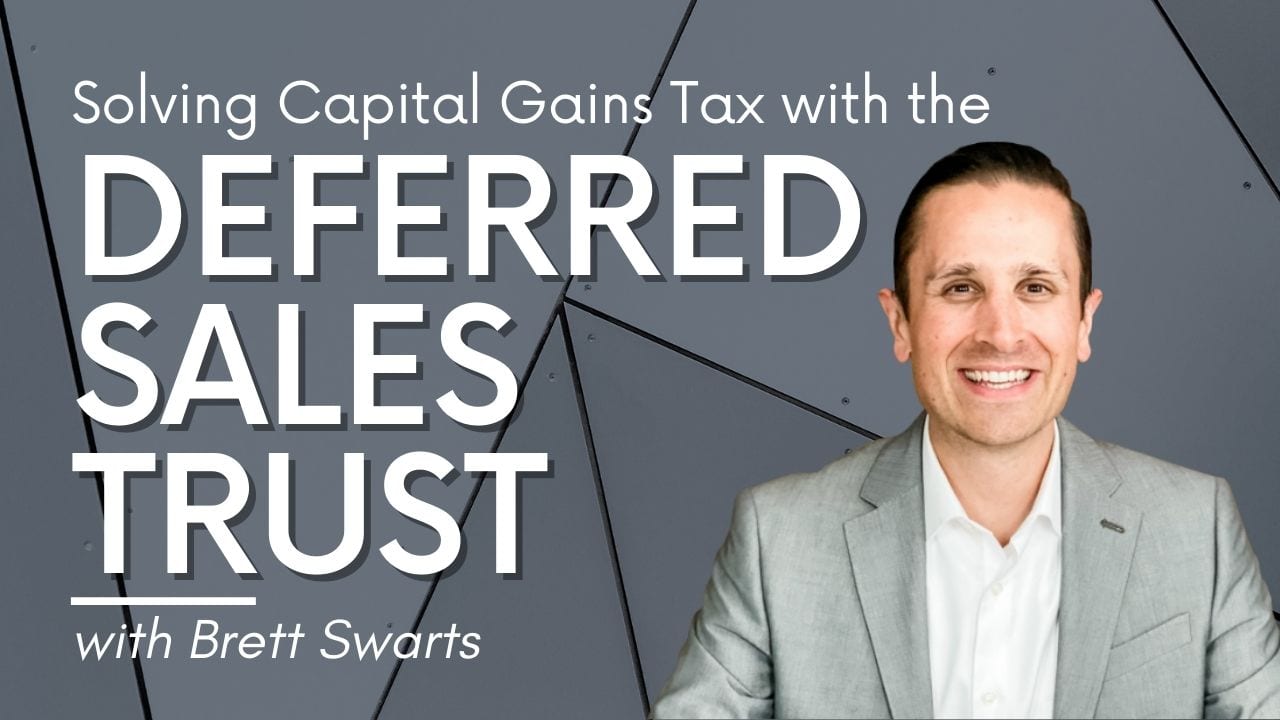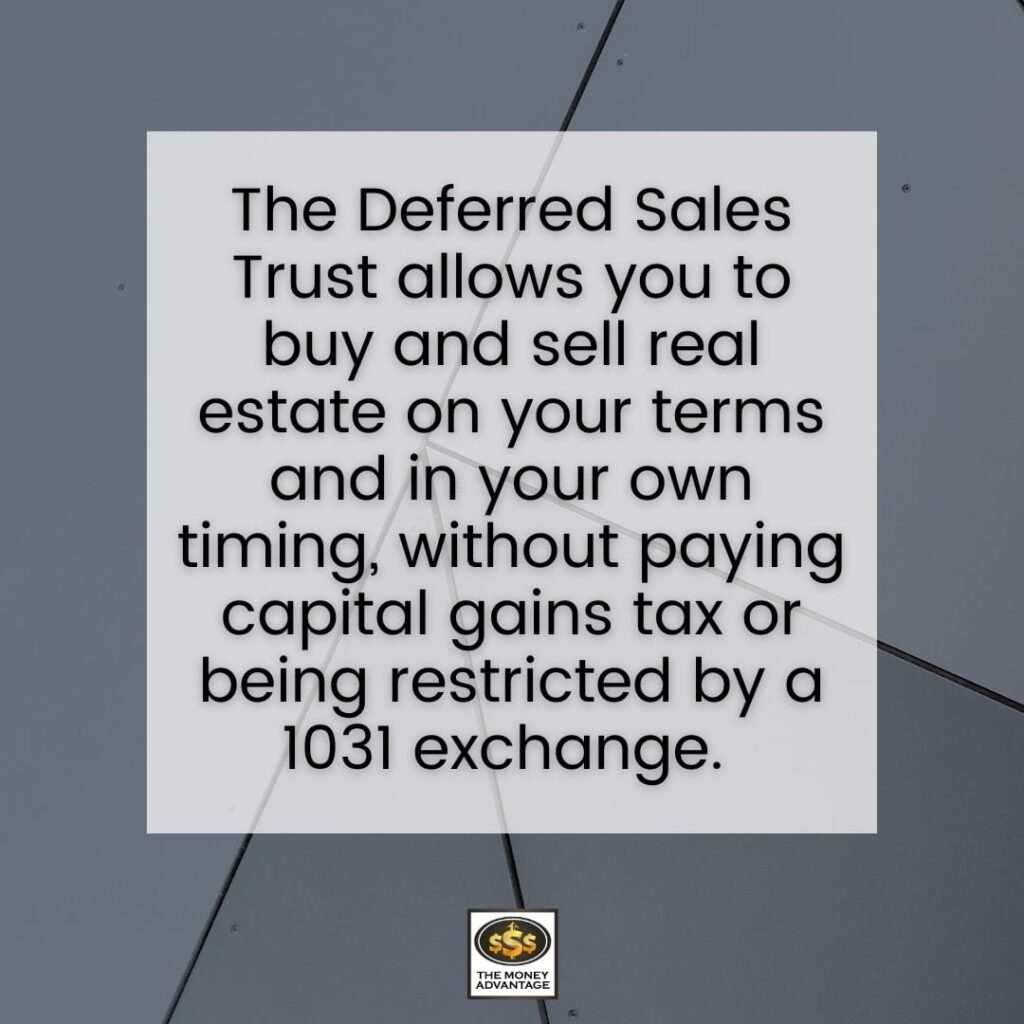
Deferred Sales Trust: Defer Capital Gains Taxes With More Flexibility Than a 1031 Exchange
Do you want the freedom to sell real estate at the top of the market and wait to invest until the right time, without having to rush cash into a new property with a 1031, but still be able to defer taxes? A deferred sales trust may be for you – this capital gains tax deferral strategy offers investors unprecedented flexibility.
In this episode, we’re talking with Brett Swarts about why investors need to know about the Deferred Sales Trust.
If you want out of the box solutions to capital gains, a rescue from a failed 1031, or to find out how to save capital gains taxes over the deferral limits, so you can maximize your real estate investing progress and momentum, in your own timing and on your own terms … tune in below!
Podcast: Play in new window | Download (Duration: 52:10 — 59.7MB)
Subscribe: Apple Podcasts | Spotify | Android | Pandora | Youtube Music | RSS | More
What You’ll Learn About Deferred Sales Trusts:
- Why capital gains taxes can devastate your profits – and the legal strategies the IRS encourages to minimize them
- How deferred sales trust benefits outperform 1031 exchanges – no time limits, no like-kind restrictions, complete investment flexibility
- The exact step-by-step process of how a deferred sales trust works to defer your capital gains taxes
- When to set up a DST – including the three critical windows that can save a failing 1031 exchange
- Expert insights from Brett Swarts – CEO of Capital Gains Tax Solutions and leading DST specialist
What is Capital Gains Tax?
Capital gains tax can seriously reduce profits from your investments when you sell them. And there are any number of reasons you might be selling an investment.
On investment real estate, you pay capital gains taxes on appreciation over your cost basis and the recaptured depreciation of the asset sold.
However, the tax rate for capital gains is why strategies exist to defer and diminish their effect. These are legal tax incentives that the IRS actually encourages entrepreneurs and investors to use, to continue to stimulate the economy. If you can overcome a big payment now, you set yourself up to take advantage of bigger and better opportunities.
1031 Exchange Limitations
You’ve likely heard of the 1031 Exchange, which allows you to defer capital gains tax. However, the 1031 has limits. You have 45 days to identify the new property, and 180 days to close. And, it requires an equal trade—a like-kind asset of equal or greater value.
When it makes sense, it’s a great provision, but results depend on the market.
Then, there’s the deferred sales trust—which allows you to play the long game.
What is a Deferred Sales Trust?
So what is a deferred sales trust exactly? It’s a powerful alternative to traditional 1031 exchanges that gives investors complete control over their timing and investment choices.
The Problem with Traditional 1031 Exchanges
When investors sell their properties, a 1031 Exchange is a popular choice and allows them to transfer ownership without realizing capital gains.
However, in a market like 2008, it isn’t nearly as effective. Investors who had taken on too much debt and overpaid for their properties were finding themselves selling high and then buying high.
If a 1031 exchange doesn’t seem right for you, or you’re unable to complete your exchange, you won’t want to sit on your cash.
Otherwise, you’ll be paying up to 20% in federal capital gains taxes, plus there could be additional state and Medicare taxes, depending on which state you live in. On top of that, you’ll owe depreciation recapture taxes at ordinary income tax rates.
The DST Solution
With a DST, you work with an outside trustee to sell the property within the trust. Rather than receiving a big payout upon closing, the money goes into a trust. From there, you’re only taxed as the money is distributed.
The funds from the sale allow you to diversify your investments, giving you the chance to wait for the right deal. There’s no pressure to purchase another property. Where a 1031 is quick, a deferred sales trust allows patience.
By setting up a trust, a trustee can re-invest the money from your sale in a diversified portfolio, use up to 80% of the funds to purchase new properties (without it needing to be of equal or greater value), and provides liquidity.
Deferred sales trusts put time on your side.
1031 Exchange vs. Deferred Sales Trust
How Does a Deferred Sales Trust Work?
A deferred sales trust can seem overwhelming with all the moving parts. Fortunately, you don’t have to do it alone. The IRS requires that you have a 3rd party “trustee” to oversee the management. This means you can partner with professionals, such as Brett Swarts, to find a buyer, make the sale, and set up investments.
The Deferred Sales Trust Process: Step by Step
Here’s how a deferred sales trust works in practice:
- Seller transfers asset into trust – You work with a qualified trustee to establish the trust before the sale
- Trust sells to the buyer – The trustee handles the sale transaction on behalf of the trust
- Proceeds remain in trust – Instead of receiving a lump sum, the sale proceeds stay in the trust
- Seller receives installment payments – You receive distributions over time according to your preferred schedule
- Income is taxed as distributed – You only pay taxes on the amounts you actually receive, not the full sale amount
Investment Flexibility
And if you find a real estate deal that you’re interested in, you can partner with your trust as an LLC to take the deal. You can do so immediately, or ten years down the road—you have the freedom to make the call. And you have more investment options with a deferred sales trust, unlike a 1031 exchange.

When Should You Put a Deferred Sales Trust in Place?
If you are selling an investment property, you have three windows in which you can set up your trust:
- at the close of escrow (as long as that language is put in place to establish the trust before the buyer removes all contingencies)
- day 46 (as long as you send to a qualified intermediary)
- and day 181 of a failing 1031 Exchange
If you attempt a 1031 exchange and can’t find a property—or otherwise don’t think you can complete the exchange within the 180-day window—your qualified intermediary can move it to a DST. That gives you more time to find a suitable property. Otherwise, you can end up paying the taxes you were working to defer.
Even if you feel that a 1031 exchange is a better fit for you now, being informed about DSTs can give you an efficient exit strategy instead of a tax nightmare.
Commercial Real Estate and Syndication
If you’re investing within a commercial real estate syndication, selling your property can be a headache. In a traditional syndication, the whole group has to agree when moving into a new deal. With a deferred sales trust, you can have a seamless move, and anyone who wants out can take their cut, pay their taxes, and be done. Not everyone needs to agree on the outcome, making it an efficient move.
A DST Gives you Options
Whether the real estate market is down, you’re looking to leave the market or you’re shifting from a failed 1031, a deferred sales trust gives you flexibility. It’s also a useful tool in your estate planning, as it can be a part of your living trust and passed on to your beneficiaries.
The real estate market isn’t always roses. Just like any asset class, it moves through a cycle. Don’t feel like you’re backed into a corner if you want to sell and don’t know where to reinvest right away.
Common Questions About Deferred Sales Trusts
Is a DST actually legal, or is it some kind of loophole?
It’s 100% legal, built on IRS Code §453 (installment sale rules), and not a gray-area trick. It’s a tax strategy the IRS already knows about and allows, provided it’s structured correctly.
What reporting requirements do I have for my DST with the IRS?
You’ll receive annual tax documents showing your distributions, but the trust itself handles most compliance requirements through the trustee.
What happens to my DST if I die before receiving all the payments?
The trust doesn’t just disappear; it can keep paying your beneficiaries under the terms you’ve set. They’ll pay taxes as they receive distributions, so the deferral benefit can continue across generations if managed correctly.
What happens if the IRS says my DST wasn’t done right?
If it’s poorly structured as an example, if you have a related-party trustee or control the funds directly, the IRS could call it a sham and hit you with the full tax bill. This is why working with an experienced DST professional is important.
About Brett Swarts
Brett Swarts is the CEO of Capital Gains Tax Solutions and every year equips hundreds of business professionals with the Deferred Sales Trust tool.
His experience includes numerous Deferred Sales Trusts, Delaware Statue Trusts, 1031 exchanges. He has also closed $85,000,000 in commercial real estate brokerage transactions.
Brett is an active commercial real estate broker and investor himself with experience and holdings in Multifamily, Senior Housing, Retail, Medical Office, and Mixed-Use properties.
He’s a licensed California Real Estate Broker and holds Series 22 and 63 licenses. He is a former associate at the largest Commercial Real Estate Brokerage firm in the country. This blessed him with years of experience and hands-on training from some of the best in the business.
As a trustee, he is passionate about educating on capital gains tax deferral with a Deferred Sales Trust. He is also passionate about helping others gain freedom from feeling hostage to a 1031 exchange. He helps investors divest and reinvest, all capital gains tax-deferred.
Brett Swarts is considered one of the most well-rounded capital gains tax deferral experts and informative speakers on the West Coast.
He challenges his audiences to lean into multiple capital gains tax deferral strategies, develop a passive cash flow wealth plan of their own, and preserve that wealth.
Brett lives in Roseville, California with his wife, Melanie, and their 4 daughters and 1 son.
Find Out More About Deferred Sales Trusts
Everyone’s situation is different. Before making any tax decisions, consult with your personal tax consultant or CPA.
Visit Capital Gains Tax Solutions to connect with Brett Swarts about Deferred Sales Trusts or get his book, Sell Your Real Estate of Business Smarter in 9 Steps to learn more.
Find Out Your Next Step to Time and Money Freedom
Do you want to use Privatized Banking, alternative investments, or cash flow strategies to coordinate your finances so that everything works together to improve your life today, accelerate time and money freedom, and leave the greatest legacy? We would love to help you.
Book an Introductory Call with our team today https://themoneyadvantage.com/calendar/.
By the way, to find out more about how Privatized Banking gives you the most safety, liquidity, and growth … plus gives you the ability to have your money do 2 things at the same time, boosting your investment returns.
Go to https://privatizedbankingsecrets.com/freeguide to learn more.
Thanks for Tuning In!
Thanks so much for being with us this week. Have some feedback you’d like to share? Please leave a note in the comments section below!
Don’t forget to subscribe to the show to get automatic episode updates for The Money Advantage podcast!
And, finally, please take a minute to leave us an honest review and rating on Apple Podcasts. They really help us out when it comes to the ranking of the show, and I make it a point to read every single one of the reviews we get.
Will AI Replace Financial Advisors? Why Wisdom Still Wins in Real Life Money Decisions
The Moment “Confident” Sounds Like “Certain” A few weeks ago, we found ourselves talking about how quickly AI is moving. It’s not just that it can answer questions fast—it’s that it can sound certain while doing it. And when you’re staring at a big money decision—debt, investing, taxes, retirement—certainty feels like relief. It feels like…
Financial Planning Mistakes: The Most Risky Moves Aren’t What You Think
Bruce said something on the show that stuck with me because it’s so honest: Everyone thinks they’re an aggressive investor… until they lose money. And it’s true. Most people don’t even realize the biggest financial planning mistakes they’re making until the moment something “unexpected” happens: a market drop, a job change, a medical curveball, an…




